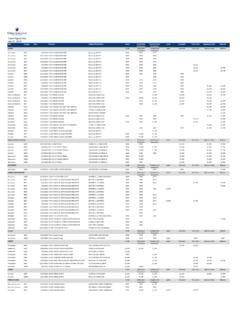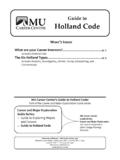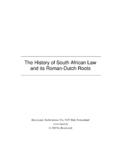Transcription of IN THE HIGH COURT OF SOUTH AFRICA [CAPE OF …
1 REPORTABLEIN THE high COURT OF SOUTH AFRICA [CAPE OF good hope provincial division ]Case No: 6541/03 In the matter between:JADE LEE PETERSEN ApplicantandTHE MAINTENANCE OFFICERSIMON S TOWN MAINTENANCE COURT First RespondentGASANT ABRAHAMSS econd RespondentSAADIA ABRAHAMS Third RespondentBEULAH PETERSEN Fourth RespondentEUGENE BREDENKAMP Fifth RespondentJUDGMENT DELIVERED: 11 NOVEMBER 2003 FOURIE, J: [1]In Motan and Another v Joosub 1930 AD 61, it was held that in terms of our common law the paternal grandfather of an extra marital child owes no duty of support to the child. The issue in this application is whether the common law rule as enunciated in Motan, passes constitutional muster.[2]The applicant, an 18 year old single female, gave birth to a boy ( the child ) on 7 January 2003.
2 The natural father of the child admits paternity, but has failed to contribute towards the maintenance of the child. In June 2003, the applicant approached the Maintenance COURT at Simon s Town and an enquiry in terms of section 10 of the Maintenance Act No. 99 of 1998 ( the Maintenance Act ) was held with a view to enquiring into the provision of maintenance by the father of the child. However, in view of his poor financial position, the father was only able to offer payment of an amount of R200,00 per month, which amount the applicant maintains is grossly inadequate to enable her to maintain the child. The applicant is a student with no income and she and the child are supported by her parents with whatever means they have at their disposal. [3]On 20 July 2003, the applicant lodged a complaint with the first respondent in terms of section 6(1) of the Maintenance Act, to the effect that the paternal grandparents of the child are legally liable to maintain the child, but have failed to do so.
3 The applicant, through her legal representative, requested the first respondent to summon the paternal grandparents of the child to attend an enquiry in terms of Section 10 of the Maintenance Act, with a view to enquiring into the provision of maintenance by the paternal grandparents of the child. The first respondent, however, refused to take such steps and in her affidavit which forms part of the papers in this application, she states that her decision was taken on the basis of my understanding that the law does not recognise a legal duty of support by the paternal grandparents of an extra marital child. I was not in a position to deviate from this principle which, as I understand it, finds authority in the case of Motan v Joosub 1930 AD 61.
4 2[4]The applicant then launched the present application in which the main relief sought is a mandamus directing the first respondent to take the necessary steps for an enquiry to be held in terms of Section 10 of the Maintenance Act, to consider the applicant s complaint that the paternal grandparents of the child are liable to maintain the child, but fail to do so. The applicant has joined the paternal grandparents of the child as second and third respondents and the maternal grandparents as fourth and fifth respondents.[5]The application was initially opposed by the first respondent, but the opposition was subsequently withdrawn and she abides the decision of the COURT . The second to fifth respondents do not oppose the application, but Ms.
5 Weyer was appointed as amicus curiae by the Cape Bar Council to assist the COURT in determining the matter. [6]The Motan decision is generally accepted as authority for the assertion that the paternal grandparents of an extra marital child do not owe a duty of support to the child. The interpretation of the common law in Motan and the resultant denial of a duty of support by the paternal grandparents of an extra marital child, has even prior to the present constitutional dispensation, been widely criticized by SOUTH African writers. F. P. van den Heever, Breach of Promise and Seduction in SOUTH African Law (1954) at 70 says the following: It is submitted that the decision is so patently wrong that it should be 3reconsidered; for it is based on legislative considerations and methods, which are, moreover, unsound.
6 It is contrary to public policy and humanity and should, if necessary, be rectified by the legislature. See too: Boberg s, Law of Persons and the Family, Second Edition, 423 and 424 (footnotes 312 and 313); Jordaan and Davel, Law of Persons Source Book, Second Edition, 358 360; Lee and Honor , Family, Things and Succession, paragraph 161 (footnote 3); Van der Vyver en Joubert, Persone en Familiereg, Third Edition, 223 224; Barnard, Cronje and Olivier, The SOUTH African Law of Persons and Family Law, 314 (footnote 81) and Wille s Principles of SOUTH African Law, Eighth Edition, 214. Spiro, Law of Parent and Child, 395, however, supports the interpretation of the common law in Motan and states that the Hooge Road of Holland never decided in favour of a duty of support between an extra marital child and his/her paternal grandparents.
7 [7]Mr. Abduroaf, who appears for the applicant, submitted that the common law rule as interpreted in Motan, violates the extra marital child s constitutional rights to equality and dignity enshrined in sections 9 and 10 of the Constitution of the Republic of SOUTH AFRICA , Act No. 108 of 1996 ( the Constitution ) and is contrary to the best interest of the child (See section 28(2) of the Constitution). He accordingly submits that the common law rule is unreasonable and unjustifiable and should be declared unconstitutional and invalid. [8]I am bound by the decision in Motan with regard to the interpretation of the common law, but section 173 of the Constitution provides that the COURT has the inherent power to develop the common law, taking into account 4the interest of justice.
8 Section 8 (3) (a) of the Constitution enjoins the COURT in order to give effect to a right in the Bill of Rights set out in Chapter 2 of the Constitution, where necessary, to develop the common law to the extent that legislation does not give effect to that right. Section 39 (2) of the Constitution provides that when developing the common law, the COURT must promote the spirit, purport and objects of the Bill of Rights. [9]The discharge of this duty to develop the common law, involves a two stage enquiry to be undertaken by the COURT . The first stage is to consider whether the existing common law, having regard to the section 39 (2) objectives, requires development in accordance with these objectives. This requires a reconsideration of the common law in the light of section 39 (2) of the Constitution and involves a careful examination of the existing principles which underpin the common law rule and a comparison thereof with the key principles of the Constitution.
9 If this enquiry leads to a positive answer, the second stage concerns itself with how such development is to take place in order to meet the section 39 (2) objectives. See Carmichele v Minister of Safety and Security and Another 2001 (4) SA 938 (CC) at 955I 956C; Rivett Carnac v Wiggins 1997 (3) SA 80 (C) at 87E F and McNally v M & G Media (Pty) Ltd and Others 1997 (4) SA 267 (W) at 274 G 275C. [10]The rationale for this common law rule is described as follows in Motan at 70:5 I now come to Mr. de Villiers argument that we ought to draw no distinction between the maternal and the paternal grandfather. They are both bound to the illegitimate child of their daughter or son respectively nexu sanguinis and therefore the same duty lies upon both.
10 From an ethical point of view there is much to be said for this contention, and the Civilians may have taken this view if there were no great practical difficulties in the way. But there are. The father of the mother of an illegitimate child knows full well that it is his daughter s child, and if called upon to pay for its support, the proof of the nexus sanguinis is at hand. If, however, the paternal grandfather is called upon to pay, he may perhaps be sufficiently certain in those cases where the woman is the concubine of his son, where they live together as man and wife, but in no other case can he be certain. He must either accept the word of the mother or trust to the wordly wisdom of his son. He is called upon to prove a negative where he has no real means of repelling the claim.
















